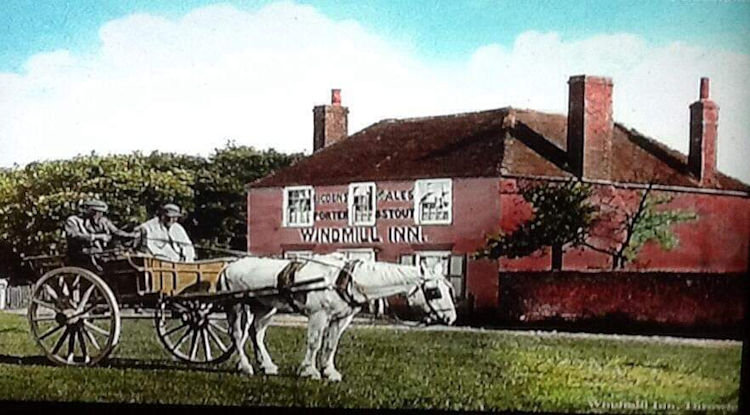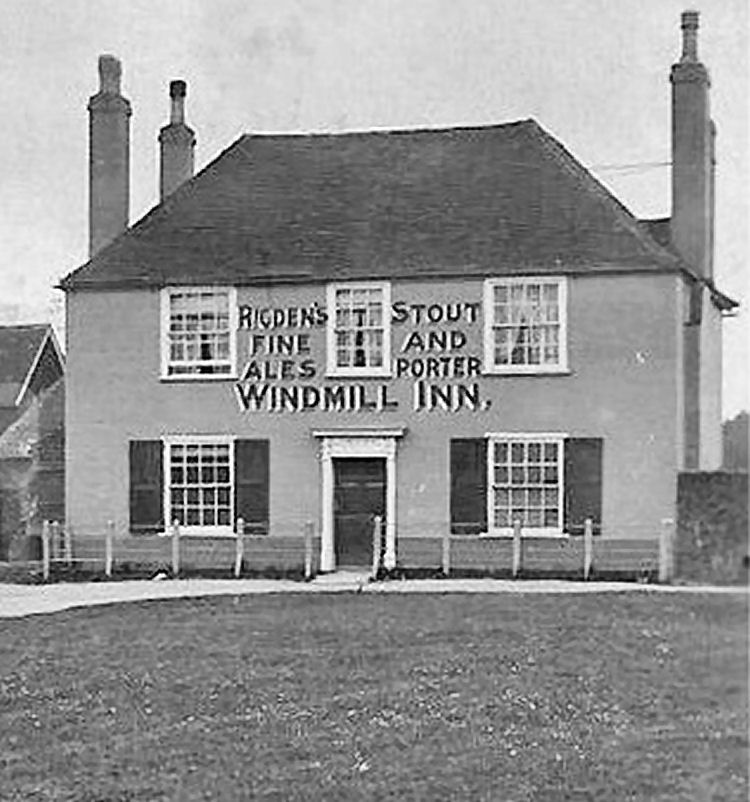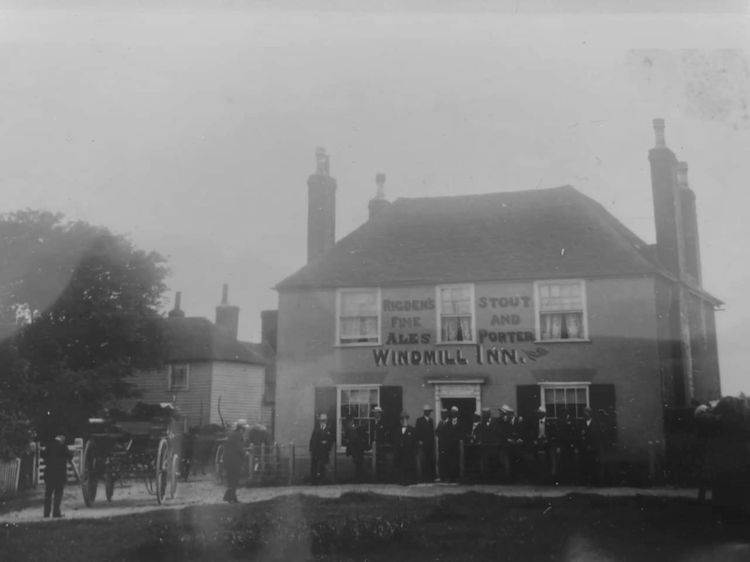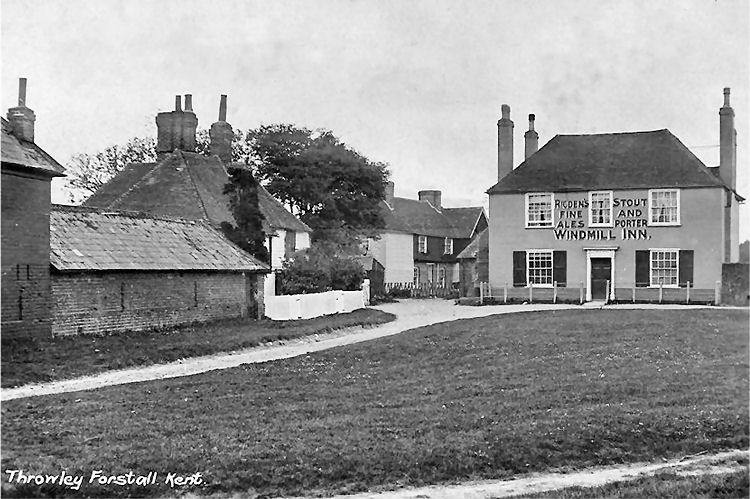|
Canterbury Journal, Kentish Times and Farmers' Gazette - Saturday 13 November 1847.
The Stabbing case at Throwley, near Faversham.
The quiet village of Throwley near Faversham, near which is the seat of
Lord Harris, has been the scene of a most tragical occurrence, from the
effects of which a man of the name of Richard Cox has died.
Wednesday week the ploughing match of the Faversham Agricultural
Association took place at the above Village, which caused a great many
of the agricultural population to meet together, and after the match a
party of them adjourned to the public house, when a dispute arose
between the deceased and a labourer, named Edward Spillett, which ended
in a fight outside the house. It appears the deceased had obtained the
advantage of Spillett, and had got him on the ground, when the latter it
is supposed, took out his knife and stabbed deceased in several parts of
the body; from one of the stabs deceased entrails protruded. Spillett
was immediately taken into custody, and underwent an examination on
Thursday, before Mr. E. Jarman, one of the county justice's, when he was
remanded for further examination until the fate of Cox could be known.
From the first no hopes were entertained of the deceased's recovery, and
he expired on Friday morning, about 7 o'clock. Both the deceased and the
accused were men of very bad character.
Spillett underwent a further examination before the Rev. Dr. Poore
(chairman of the division of Upper Scray). G. Hilton Esq., General
Gooselin, and N. J. Knatchbull Esq., at the "Ship Inn," Faversham, on
Monday last, when the following evidence was adduced.
Daniel Rook, of Throwley, labourer examined:- On Wednesday evening last
I was at the "Windmill" public house, Throwley, in company with Richard
Cox (the deceased,) Edward Spillitt, Charles Clinch, and others, between
8 and 9n o'clock. Spillett and Clinch left the house, and went out on
the green, just in front of the house, to fight. They had had a few
words indoors. I and Cox and several others went out at the same time to
see them fight. They fought about 10-minutes or a quarter of an hour,
and Clinch then gave in. Cox acted a second to Clinch for the last round
or two. As soon as Clinch gave in, Cox said he would fight "e'er a
Spillett there and there with one hand;" and then Cox and Spillett went
at it directly. Cox hit Spillett first, and Spillett returned it.
Spillett then went down and Cox on top of him. They got up and fought
again, and went down again and Cox was on Spillett again. I went up and
said to Cox, "Come, Dick, get up;" and he said, "I can't, he holds me;"
and I pulled him partly up, and he got up and went towards the public
house. I think I was the first person who went up to Cox after they
fell; it was very dark. Cox and Spillett were both "fresh." There were
between 20 and 30 persons round whilst Cox and Spillett with fighting;
but no one was near enough to touch Cox but Spillett.
George Epps, of Throwley, labourer examined:- I was present when
Spillett and Clinch fought on the evening of Wednesday last on Throwley
Green. After Clinch gave in, I heard Cox offer to fight any of the
Spillett's with one hand. I then saw Cox go up and strike Spillett, and
Spillett struck him again, and then they joined, and Spillett fell and
Cox on him; they got up, and I went up to Spillett and told him to put
on his clothes and go home, and he said, "No, ----- his heart, if he
comes here again, I'll kill him." Cox came at him again and Spillett
fell down again and Cox on top of him, and Rook came up and pulled him
off.
John Stevens, of Faversham, labourer examine:- I was at the "Windmill"
public house on Wednesday evening last, 3rd of November, and went out on
the green just after Clinch and Spillett had done fighting. I heard Cox
say to he would fight any of the Spillett's on the ground with one hand.
Cox and Spillett had a round, I believe; but I was behind and did not
see it. I then saw Cox and Spillett have another round, and Spillett
went down, and Cox on him. I got through the crowd, and went up and took
hold of Cox by the right arm to help him up, and he said "I am stabbed,
Spillett is the man who done it, and no one else," and he asked me to
let him lie. When I got through the crowd up to Cox he was on the
ground, but I did not then see Spillett, and just after Filmer came up.
I assisted Filmer in getting Cox into the house; we undressed him, and
on examining him found several wounds, one in the small of the back, to
which I held a handkerchief to stop the blood, and another in the belly,
from which is entrails were hanging out. Cox asked to see Spillett, that
he might forgive him, and said that he was the man who has done it, and
no one else.
Julious Gaborian Shepherd of Faversham, Clerk to the magistrates,
examined:-
On Thursday last attended, in company with Mr. Jarman, one of the county
magistrates, at the "Windmill" public house, Throwley, for the purpose
of taking the statement of Richard Cox, who I understood was dying from
wounds received by him on the previous evening. I produced a written
declaration and statement; made by him, he being fully aware of his
situation, and that he was then in a dying state. After the examination
was taken and signed, it was ascertained that Spillett was in the house,
and he was brought up before Cox, in the presence of Mr. Jarman and
myself; and the examination so taken was then read over to Cox in the
presence of Spillett, and he again stated that the whole was quite true
and correct, and that he felt sure he could not live long.
The statement was then put in, which was to the effect as detailed by
previous witnesses, and that when on the ground with Spillett he felt
him stab him.
George Mundy, of Charing, surgeon, examined:- I was sent for on
Wednesday evening last, at 9 o'clock, to attend at Throwley. I went and
found Richard Cox at the "Windmill" public house, he was in a complete
state of collapse from haemorrhage occasioned by loss of blood from
wounds received in different parts of the body. I examined him, and
found one in the abdomen, another on the right side just below the short
ribs, and four others at different parts. The one in the abdomen was
about an inch and a half in length, and from it the small bowels had
protruded; the parts were inflated and inflamed in consequence of the
smallest of the sperture of the wound. The wound on the right side was
rather more than an inch wide, and, as I supposed, had penetrated nearly
four inches. I have since discovered from a post-mortem examination of
the body, that the liver had been wounded through the aperture or wound
on the right. I felt sure that Cox's death was occasioned by the wounds
he had so received. The wounds were inflicted by an instrument similar
to the knife now produced (a knife found upon the prisoner Spillett when
taken into custody.) They were inflicted by a single-edged instrument. I
saw Cox about ten minutes after Mr. Jarman and Mr. Shepherd had left him
on Thursday, and I then told him that from the nature of the wounds it
was quite impossible he should could live, and asked him if he could
tell me who inflicted those wounds; and he said it was Edward Spillett.
Several other witnesses, who were present at the fight, were called and
examined, but their testimony was similar to that of the former
witnesses.
At the conclusion of the examination the Rev. Dr. Poore told the
prisoner he would stand committed to Maidstone Assizes, to take his
trial for the wilful murder of Richard Cox. The prisoner is a young man,
having a wife and two children, and was much affected during the
examination.
An inquest was held on Tuesday before Mr. Delasaux, when the evidence
was pretty much a recapitulation of that given before the magistrates,
with the addition of the constables who took the prisoner into custody.
Giorgos Austin, constable of Eastling, deposed, that he went in company
with Theobalds to the house of Spillett, the day after the occurrence,
and told him that he must take him prisoner; when Spillett asked "what
for?" Theobalds said "I suppose you know what for," and he replied "Yes
- I suppose it's for that job of Cox's." Theobalds said "Yes it is;" and
desired him to get a light, when he (Theobalds) said he must search
Spillett to see if he had anything about him. Spillett then pulled out
of his pocket a knife (now produced). Finding on examination that there
were no marks of blood on it, but that it was greasy, and making a
remark to the effect, Spellett said he had used it in eating his supper.
There were several marks of blood on Spillett's clothes.
Thomas Theobolds, constable, corroborated this evidence, adding that
after he had Spillett in custody, he said he had heard that Cox was
stabbed; to which he (witness) replied in the affirmative.
The jury after a lengthened and patient inquiry returned the verdict of
Manslaughter against Edward Spillett.
|
|
From the Kentish Chronicle and General Advertiser, 31 August, 1861. Price 1 1/2d.
INQUEST AT THROWLEY.
An inquest was held at this is place on the body of James Pearson, a
labourer, aged 30, before T. T. Delasaux, Esq., the coroner, on Monday
last.
Henry Sayer deposed:— I live at Maidstone. I have been in the employ of
Mr. Alfred Cobb, of Throwley, for the past fortnight, harvesting. On
Saturday night last, between the hours of eight and nine, I retired to
rest with my wife, and Thomas Waters and his wife and child, in a lodge
on New Bridge Farm. There was a quantity of straw in the lodge upon
which we slept. About eleven o’clock the same night I heard some one
call “fire,” and I instantly saw a blaze in the lodge, the straw being
alight. I then called the others, and we all got out safe. The deceased
slept on some straw outside the lodge.
Mary Waters:— I live at Maidstone. I with my husband and others, went to
rest in a lodge on New Barn Farm at about nine o’clock. At eleven
o’clock my husband awoke me; and the straw in the lodge close to where
Mark Lawrence and his wife were was in flames. Either Mark Lawrence or
his wife had a light (a candle I believe) shortly previous to the straw
catching fire. They were to sleep in the lodge.
Frederick Ford, labourer of Faversham, said:— I left the “Windmill”
public-house, at Throwley, at about twelve o’clock on Saturday night, and was proceeding towards home, when I saw a
lodge at New Barn in flames, and several persons running therefrom. Shortly afterwards I heard a scream
which proceeded from the end of the lodge, and then the deceased said,
''Take poor Jem away,” I immediately took him away from the fire. He was
very much burnt about every part of his person, and I assisted in taking
him to a cottage a short distance from
the place where found him. I then went home.
Thomas Waters and Louisa Sayer.
Mary Cheeseman, of Throwley said:- I live in a cottage on New Barn Farm.
On Saturday night between the hours of twelve and one the deceased was
brought away from the burning lodge, and taken into the cottage occupied
by Mrs. Wood. He was severely suffering from being burnt. He died
yesterday morning about seven o’clock from the injuries he received.
The Jury returned a verdict of “Accidental death.”
|
|
From the
https://www.kentonline.co.uk By Helen Geraghty, 13 May 2019.
Charles Bainbridge house for sale was once the Windmill Inn.
On top of the North Downs, this former village pub comes with
original 18th-century fireplaces, exposed beams and eight acres of land.
Once known as the Windmill Inn, it originally took its name from a
neighbouring smock mill, now long gone.
While there’s still plenty of character, the property at Throwley
Forstal near Faversham is now a comfortable four-bedroom home, with the
two large pub rooms at the front now a dining room and an extended
sitting room, each with a fireplace and linked by double doors.
The Old Windmill Inn is now a four-bedroom home.
An L-shaped kitchen/breakfast room is at the back of the house and the
house has a downstairs cloakroom.
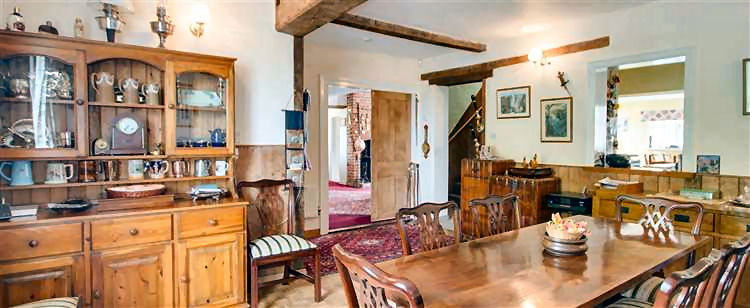
There are beams and fireplaces.
There’s still fun to be had in the old function room at the back, which
makes a great games room or party venue. And instead of barrels, the old
beer cellar now houses an oil-fired boiler providing the central heating
and hot water.
On the first floor the master bedroom has an en suite shower room. There
are three further bedrooms and a family bathroom.
There is driveway parking as well as a garage, workshop and some other
outbuildings.
At the back is a courtyard, lawns, mature trees and a kitchen garden
with greenhouse. Grazing land is fenced and has a separate access,
making the total plot of eight acres.

The old pub comes with eight acres.
Paul Willmott of selling agent Charles Bainbridge, says: “Throwley
Forstal is a picturesque village surrounded by delightful farmland and
countryside.”
The house is priced at £925,000.
For information ring the agent on 01227 780227. |
